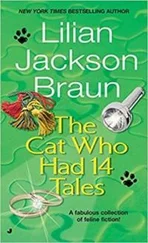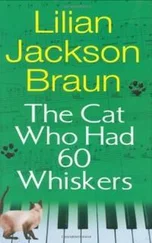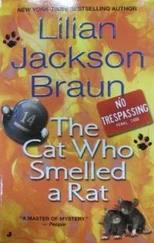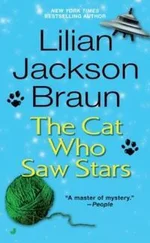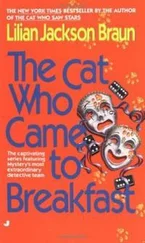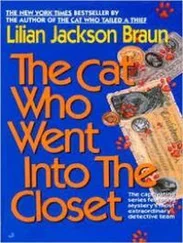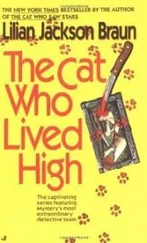Simmons arrived on the Saturday-morning shuttle flight. Qwilleran picked him up at the airport.
“Janice is a nice woman,” the visitor said. “Glad to see that she’s finally getting married. Who is the guy?”
“John Bushland, prizewinning photographer and one of my best friends. He likes to be called Bushy and makes a joke of the fact that he’s losing his hair.”
“I hope he likes waffles. And parrots. Where’s the dinner being held?”
“At Boulder House Inn, a picturesque place on the shore. You and I will arrive early, and the innkeeper will hide you in his office with a drink. The rest of us meet on the parapet overlooking the lake. Just as we are about to toast the newlyweds, you enter. . . .”
“And the bride has a heart attack,” Simmons guessed.
They had arrived at the barn, where Simmons had been a guest on his previous visit. “It doesn’t look a day older,” he remarked of the century-old barn.
He was greeted by the Siamese, who treated him like an old friend. “They’re very handsome creatures. The big one looks frighteningly intelligent, if you ask me, and the little one is a flirt.”
They were sitting in the lounge area, having coffee and Scotch shortbread.
“You know, Qwill,” he went on, “I never really paid any close attention to cats, but my mother—Lottie was her name—was crazy about them. After she died, I started seeing cats through her eyes! I’d look at a strange cat and know exactly what Lottie would say. It kind of shook me up.”
“Consider it your inheritance from Lottie,” Qwilleran said. “My mother died when I was in college, majoring in baseball and jazz bands. Suddenly I became interested in words ! I switched to journalism, started writing a book, joined the Shakespeare Club. There’s only one way I can explain it: She had bequeathed me her love of words. She was a librarian.”
At five o’clock that evening, Simmons was undercover at Boulder House, while Qwilleran and Polly were on the parapet with the newly wedded couple and their attendants. Bushy, Roger, and Qwilleran were bonded in friendship, having been shipwrecked on an island during a violent summer storm.
The three couples looked festive but informal: Janice, Sharon, and Polly in short-sleeved pastel dresses; the three men in white summer jackets, summer shirts, and no ties.
The men were talking about their ordeal. At that moment, they were joined by another man in a light-blue summer jacket.
Janice screamed, “Simmons! What are you doing here?”
“Just looking for a drink,” he said.
Concealed under his coat was a worn school notebook, which he handed to the bride. “Secrets of Thelma’s Dinner Club.”
Janice was overcome. She said, “I’d faint if I wasn’t having such a good time!”
When the newlyweds were asked about their plans, they said that they would live in Thelma’s wonderful house on Pleasant Street; Bushy would no longer rent space for a commercial studio; a darkroom could be installed in the basement; Janice was learning the fine points of developing and printing; portrait photography could be done in the handsome main rooms of the house.
Then they extended an invitation to everyone for the next day: a cruise among the picturesque offshore islands, with a picnic lunch aboard while anchored near the lighthouse. Bushy had a great cabin cruiser named the View Finder, and Janice was noted for her exciting picnic lunches. And they would see that Simmons got to the airport in time for the five-o’clock shuttle.
Simmons accepted the invitation with pleasure. So did the MacGillivrays. So did Polly.
Only Qwilleran had to decline, saying that he was doing a matinee at two o’clock.
Then the storytelling began: Simmons, about Thelma’s dinner club; Janice, about Thelma’s parrots; Polly, about embarrassing questions that librarians are asked.
Dinner was served in the glassed-in porch. The oval table was laid with a white banquet cloth and centered with two bowls of lilies in mixed white and yellow. They talked with exuberance, reminisced endlessly, laughed a lot, and had a good time. If anyone noticed it, the food was excellent. And the serving of dessert coincided with the setting of the sun over a hundred miles of lake.
The party ended with hugs, handshakes, and felicitations. The Bushlands and the MacGillivrays took home the bowls of white and yellow lilies. Qwilleran dropped off Polly at Indian Village and drove to the barn with his houseguest.
Simmons said, “Very interesting woman, Polly. You don’t often hear such a pleasant voice. Has she ever been married? What’s the bookstore she mentioned?”
“It’s being built in downtown Pickax, where the previous bookstore stood for fifty years before being torched.”
“Did they get the arsonist?”
“He and two coconspirators are in prison. The old building was built in 1850 by a blacksmith who moonlighted as a pirate, and his loot was said to be buried under what had become a parking lot. At the official groundbreaking for the new store, thousands of people came from all over the county to see the pirate’s gold coins. The chest was found, but it was empty.”
“How did the crowd react. Did they riot?”
“They thought it was a good joke! This is Moose County, not Los Angeles.”
When they arrived at the barn, Qwilleran said, “Would you like a nightcap? Or a refresher?”
“I’d like to try that Squunk water you drink.”
“Red or white?”
“Oh. Red.”
They sat around the big square cocktail table, and Qwilleran gave him a book. “Take this home. It’s a collection of legends that has just been published—all about pirates, ghosts, and other wholesome subjects. You can read it to your grandchildren. Do you read to them?”
“Yes, but the eight-year-old reads to me! Do you still read to your cats?”
“I do, and if Koko starts reading to me, I’m really going to get worried.”
Simmons asked, “What’s that book on the floor?”
“Koko keeps pushing it off the shelf, expecting me to read it aloud. It’s The Hunting of the Snark. ”
“What’s a snark? Sounds like something spelled backward.”
“It’s a cross between a snake and a shark—just nonsense verses. Koko seems to sense it’s by the author of Alice’s Adventures in Wonderland, which is one of his favorites.”
Koko knew he was being talked about, and he made his presence known.
Simmons said, “Friendly cuss, isn’t he?”
“He knows you’re a cop. He likes cops.”
“Which reminds me,” Simmons said, “on the phone you mentioned an incident that happened on your property. What was that all about?”
“I have a hundred acres of beach frontage, and a well-dressed male was killed execution-style in a wooded area there. No ID or valuables on the body. The SBI is handling the case. Meanwhile, our police chief tells me there’s been a similar incident in northern Michigan.”
Simmons nodded. “I remember an identical case out west. A guy hung around a sportsmen’s bar, talking about hunting and fishing and saying he knew a great spot for a hunting lodge. He showed snapshots of a lake with ducks flying and a trout stream with a waterfall. The property belonged to a friend who had to sell it to pay a child-support judgment or go to prison. He would sell it for a tenth of its value. He found a sucker who drove up into the hills with him and his friend, both crooks. They had a fake surveyor’s map and a fake title—and a gun. The sucker had the cash. And that was the end of him and his great deal!”
“Did they ever solve the case?”
“Not until it happened in a nearby state, and the investigators were able to trace a pattern. That’s the pity of it; there’s always some sucker looking for a fantastic deal.”
Читать дальше

